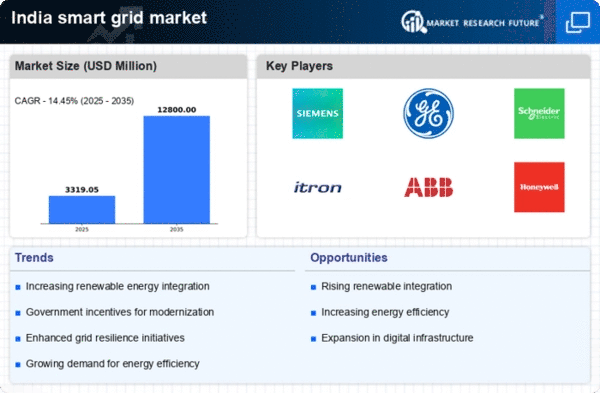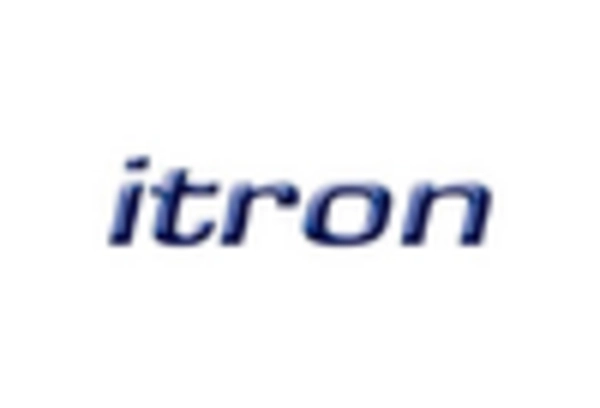Rising Energy Demand
The increasing energy demand in India is a pivotal driver for the smart grid market. As urbanization accelerates and the population grows, the need for efficient energy distribution becomes paramount. The smart grid market is poised to address this challenge by enhancing grid reliability and efficiency. According to estimates, India's electricity demand is projected to grow by approximately 6.5% annually, necessitating innovative solutions. Smart grids facilitate real-time monitoring and management of energy resources, which is essential for meeting this rising demand. Furthermore, the integration of advanced technologies can optimize energy consumption patterns, thereby reducing wastage. This trend indicates a significant opportunity for stakeholders in the smart grid market to develop and implement solutions that cater to the evolving energy landscape in India.
Technological Advancements
Technological advancements are significantly influencing the smart grid market in India. Innovations in communication technologies, data analytics, and automation are transforming how energy is managed and distributed. The smart grid market is witnessing the adoption of Internet of Things (IoT) devices, which enable real-time data collection and analysis. This capability allows for improved grid management and enhances the ability to predict and respond to energy demand fluctuations. Furthermore, advancements in energy storage technologies, such as batteries, are facilitating the integration of renewable energy sources. As these technologies become more affordable and accessible, they are expected to drive the growth of the smart grid market. The potential for increased efficiency and reduced operational costs presents a compelling case for stakeholders to invest in smart grid solutions.
Investment in Infrastructure
Investment in infrastructure is a critical driver for the smart grid market in India. The need to upgrade aging electrical infrastructure is becoming increasingly urgent as the demand for reliable energy supply grows. The smart grid market is likely to benefit from substantial investments aimed at modernizing the grid. Reports indicate that India requires an estimated $100 billion in infrastructure investment over the next decade to enhance its energy systems. This investment will not only improve grid reliability but also facilitate the integration of renewable energy sources. Additionally, public-private partnerships are emerging as a viable model for financing these infrastructure projects, further stimulating growth in the smart grid market. As stakeholders recognize the importance of resilient energy systems, the focus on infrastructure investment is expected to intensify.
Government Policy and Regulation
Government policies and regulations play a crucial role in shaping the smart grid market in India. The Indian government has introduced various initiatives aimed at modernizing the energy sector, including the National Smart Grid Mission. This mission aims to promote the development of smart grid technologies, which are essential for enhancing the efficiency and reliability of the power supply. The smart grid market benefits from these regulatory frameworks, as they provide a conducive environment for investment and innovation. Additionally, the government has set ambitious targets for renewable energy integration, which further drives the demand for smart grid solutions. With a projected investment of over $20 billion in smart grid technologies by 2025, the regulatory landscape is likely to continue evolving, fostering growth in the smart grid market.
Consumer Awareness and Engagement
Consumer awareness and engagement are increasingly driving the smart grid market in India. As individuals become more conscious of their energy consumption patterns, there is a growing demand for solutions that promote energy efficiency. The smart grid market is responding to this trend by offering technologies that empower consumers to monitor and manage their energy usage effectively. Initiatives such as demand response programs and smart metering are gaining traction, allowing consumers to participate actively in energy management. This shift towards consumer-centric solutions is likely to enhance the overall efficiency of the energy system. Moreover, as awareness of sustainability and renewable energy grows, consumers are more inclined to support smart grid initiatives. This engagement is expected to play a vital role in shaping the future of the smart grid market in India.
















